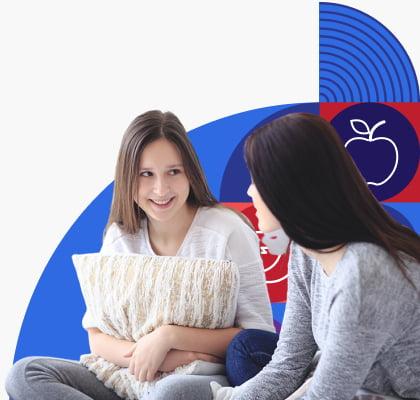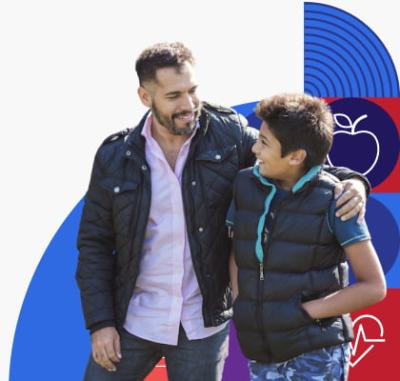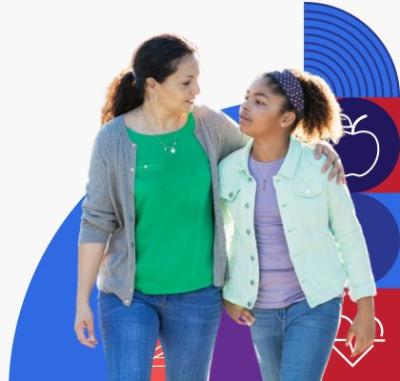Healthy Living
Talk to Your Kids About Tobacco, Alcohol, and Drugs

The Basics
Overview
Talk to your child about the dangers of tobacco, alcohol, and drugs. Knowing the facts will help your child make healthy choices.
What do I need to say?
When you talk to your child about tobacco, alcohol, and drugs:
- Find out what they already know
- Teach them the facts
- Be prepared to answer your child’s questions
- Give them clear rules
- Talk with them about how to say “no"
When to Start
When should I start talking with my child?
Start early. By preschool, most children have seen adults smoking cigarettes or drinking alcohol, either in real life, on TV, or online.
Make sure your child knows right from the start that you think it’s important to stay safe and avoid drugs.
Here are more reasons to start the conversation early:
- Almost 9 out of 10 people who smoke start smoking before they turn 18
- By the time they're in 8th grade, about 4 in 10 kids say alcohol is easy to get
- At age 12, some kids are already using drugs like marijuana or prescription pain relievers
What if my child is older?
It’s never too late to start the conversation about avoiding drugs. Even if your teen may have tried tobacco, alcohol, or drugs, you can still talk about making healthy choices and how to say “no” next time.
Get more tips to help your teen stay away from drugs.
Medicine Misuse
What do I need to know about prescriptions and other medicines?
When you talk to your child about the dangers of drugs, don’t forget about drugs that may already be in your home, like prescription or over-the-counter (OTC) medicines.
Prescription or OTC drug misuse is when a person uses a drug to get high, or use them differently than they’re supposed to. People might misuse drugs by:
- Taking too much of a prescription or OTC drug
- Taking a prescription drug prescribed to someone else
When you don’t take them safely, prescription and OTC medicines can be just as addictive and dangerous as other drugs.
Commonly misused prescription or OTC drugs include:
- Opioid pain medicines, like Vicodin, OxyContin, or codeine
- Medicines for anxiety or sleep problems, like Valium or Xanax
- Medicines that treat ADHD (attention deficit hyperactivity disorder), like Adderall or Ritalin
Make sure to talk to your child about the dangers of prescription drug misuse. Get tips for talking about drug misuse with your child.
Set a good example:
- Never take someone else’s prescription medicine or give yours to anyone else
- Keep track of the medicines in your home, and store them in a locked cabinet
- Get rid of unused medicines safely
Why It Matters
Why do I need to talk to my child?
Research shows that kids do listen to their parents. Children who learn about drug risks from their parents are less likely to start using drugs.
When kids choose not to use alcohol or drugs, they're also less likely to:
- Have serious trouble in school
- Get hurt in a car accident
- Be a victim of crime
- Have a problem with addiction as an adult
If you don't talk about it, your child may think it’s okay to use alcohol and other drugs.
Take Action
Start Talking
Talk with your child about tobacco, alcohol, and drugs today — and keep the conversation going.
Talk with your child early and often.
Start conversations about your values and expectations while your child is young. Your child will get used to sharing information and opinions with you. This will make it easier for you to continue talking as they get older.
Here are some tips for talking with your child about tobacco, alcohol, and drugs:
- Use everyday events to start a conversation. For example, if you see a group of kids smoking, talk about how tobacco harms the body.
- Give your child your full attention. Turn off your TV, radio, cell phone, and computer — and really listen.
- Try not to “talk at” your child. Encourage your child to ask questions. If you don’t know the answer to a question, look it up together.
- Find age-appropriate ways to talk to your child about drugs.
- Get more tips on how to have a conversation with your child.
Teach the Facts
Teach your child the facts.
Your child needs to know how drugs can harm the brain, affect the body, and cause problems at home and in school. Kids who know the facts are more likely to make good choices. Here are some facts you can share with your child:
- If your child likes sports, focus on how smoking can affect athletic performance. You can also tell them how it affects their appearance, like causing bad breath and yellow teeth. Get the facts on tobacco.
- Remind your child that alcohol is a powerful drug that slows down the body and brain. Get the facts on alcohol.
- Tell your child how other drugs — like steroids, marijuana, and prescription medicines — affect the brain and body. Get the facts on other drugs.
Set Rules
Set clear rules for your child.
Not wanting to upset their parents is the number one reason kids give for not using drugs. Your child will be less tempted to use tobacco, alcohol, and drugs if you explain your rules clearly.
Here are some things to keep in mind when you talk to your child:
- Explain that you set rules to keep your child safe
- Tell your child you expect them not to use tobacco, alcohol, or drugs
- Let your child know what will happen if they break the rules — and follow through if they do
- Praise your child for good behavior
Help your child learn how to say “no.”
Kids say they use alcohol and other drugs to fit in with other kids. That’s why it’s important for parents to help children build the confidence to make a healthy choice when someone offers tobacco, drugs, or alcohol. Find tips for preventing drug use at every age.
And check out these strategies to help you talk with your kids about staying healthy and drug free.
Set an Example
Set a good example.
Here are a few steps you can take to set a good example for your child:
- If you smoke, make a plan to quit
- If you drink alcohol, don’t drink too much or too often
- If you misuse drugs, talk with your doctor about getting treatment
- Use prescription and OTC medicines safely
- Never drink or use drugs and drive
What if I’ve used drugs in the past?
Be honest with your child, but don’t give a lot of details. Do your best to make it a 2-way conversation — ask your child what they’re thinking and if they have any questions for you. Talk to your pediatrician if you’d like more tips for telling your child about your past drug use.
Get Help
Get help if you need it.
If you think your child may be using drugs or alcohol, get help. Don’t wait. Getting treatment early can make a difference. Follow these steps if you think your child is using drugs or alcohol.
What about cost?
Under the Affordable Care Act, insurance plans must cover alcohol, tobacco, and drug use assessments for teens. Depending on your insurance plan, your child may be able to get an assessment at no cost to you. Check with your insurance company to find out more.
If you don't have insurance, your child may still be able to get free or low-cost assessments. Find a health center near you and ask about assessments for your child.
To learn more, check out these resources:
Content last updated October 30, 2024
Reviewer Information
This information on talking to your child about alcohol, tobacco, and other drugs is adapted from material from the Substance Abuse and Mental Health Services Administration and the National Institute on Drug Abuse.
Reviewed by:
Jessica Cotto
Health Science Policy Analyst
Office of Science Policy and Communications (OSPC)
National Institute on Drug Abuse (NIDA)


